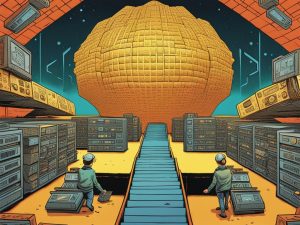Revolutionizing Material Science with AI and Robotics
On November 29, 2023, Google DeepMind and autonomous robotic systems made a groundbreaking development in material science. Spearheaded by Google’s AI division, the A-Lab initiative successfully predicted the stability of nearly 400,000 substances. This collaboration between AI and robotics is transforming material creation in laboratories, with a focus on applications in batteries and solar cells.
AI-Driven Material Discovery
Ekin Dogus Cubuk, leader of Google DeepMind’s materials discovery team, sees this venture as a significant breakthrough in using AI for scientific discovery. Published in Nature, the research showcases the AI system’s ability to generate and synthesize new materials autonomously. The AI tool, called GNoME (graph networks for materials exploration), trained on extensive data from the Materials Project and related databases, has proposed 2.2 million potential compounds and identified 381,000 new inorganic materials.
The A-Lab: A Robotic Marvel
The A-Lab is an autonomous system located at the Lawrence Berkeley National Laboratory (LBNL). It combines AI and state-of-the-art robotics to advance autonomous experimentation in material science. With a budget of $2 million, the lab’s main function is to mix and heat ingredients, analyze products, and continuously enhance synthesis procedures through machine learning. In just 17 days, this process led to the creation of 41 new inorganic materials, demonstrating the practical capabilities of AI in experimental science.
The Wider Impact
This development has significant implications. According to Carla Gomes from Cornell University’s AI for Science Institute, AI’s role in scientific discovery is an exciting new frontier. This initiative not only enables more efficient material creation but also provides a comprehensive database for global research and development. The integration of AI and robotics in material synthesis signifies a paradigm shift, offering a more efficient, precise, and extensive exploration of new materials.
While the A-Lab’s current achievements are remarkable, its future potential is even greater. The ongoing operation of the lab and its evolving database are expected to make significant contributions to the scientific community. It will provide insights into the reactivity of common solids and foster global collaboration in material science.
Hot Take: A New Era of Material Discovery
This collaboration between Google DeepMind and autonomous robotic systems marks a new era in material science. By harnessing the power of AI and robotics, scientists can predict material stability, ideate new compounds, and synthesize them autonomously. This breakthrough not only revolutionizes material creation but also offers a comprehensive database for further research and development. With the A-Lab’s continued operation, we can expect even more remarkable discoveries that will shape the future of science.





 By
By
 By
By

 By
By
 By
By
 By
By